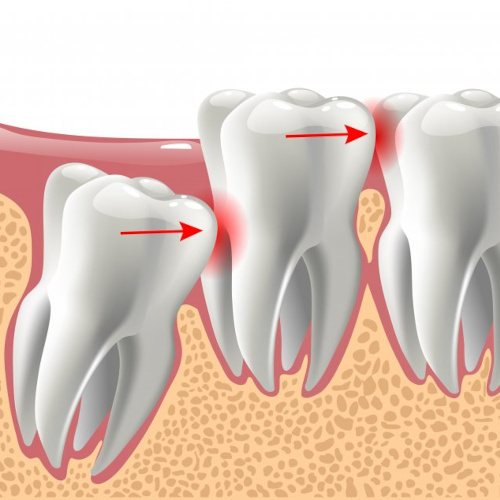
Tooth Extractions – Indian Land, SC
Protecting Your Smile from Problematic Teeth
Removal is not the first option Dr. Candon wants to consider when you have issues with a tooth, but sometimes it is the only choice. The damage may be so significant that extraction is necessary to preserve your oral and general health. When tooth extractions in Indian Land are required, our team will make sure you understand why this approach is being recommended to you and that you’re comfortable throughout the procedure. Keep reading to learn more about this emergency dental treatment and give us a call in the best interest of protecting your smile from problematic teeth!

Why Choose BridgeMill Dental Care For Tooth Extractions?
- Comprehensive Digital X-Ray Technology
- Soft-Tissue Laser For More Precise Treatment
- Dental Sedation For Comfort And Relaxation
Reasons Why Tooth Extractions Are Necessary

At BridgeMill Dental Care, tooth extractions are only recommended if the tooth in question cannot be salvaged using a dental crown or root canal therapy. Although preserving as much of the natural tooth structure as possible is ideal, removal may be the best option for your oral health if you have:
- Extensive decay or irreparable damage to a tooth
- Severe infection that could spread
- Advanced periodontal disease or jawbone loss
- Primary tooth that hasn’t fallen out
- Impacted tooth
The Process of Removing a Tooth

The last bit of advice you want to hear from your dentist is to have a tooth pulled. However, it may surprise you to learn an extraction is not as terrifying as it sounds! There are two methods commonly used for removing a tooth: simple and surgical.
A simple extraction is done for a tooth that has fully erupted and is completely above the gumline. After Dr. Candon numbs your mouth, he’ll grasp the tooth with dental forceps and rock it back and forth until it separates from the gum tissue.
Meanwhile, a surgical extraction is an ideal option for a tooth that isn’t fully above the gumline. This method involves making a small incision in the gums to access the tooth. Like a simple extraction, dental forceps will be used to grasp the tooth and remove it.
Tooth Extraction Aftercare

Following your tooth extraction, you’ll receive post-op instructions from your dentist in Indian Land that you’ll need to follow diligently to make a swift and comfortable recovery. By keeping your mouth as clean as possible, you can ensure the surgical site heals properly. Here are some aftercare tips to keep in mind:
- Take prescribed or over-the-counter pain medication as needed to alleviate your discomfort.
- Gently brush and floss around the surgical site to keep it clean.
- Rinse with warm salt water after 24 hours to disinfect the site.
- Stay hydrated and get plenty of rest to promote faster healing.
- Use a cold compress on the outside of your mouth to minimize pain and swelling.
- Avoid drinking from a straw.
- Do not eat hard, crunchy, sticky, sour, or spicy foods for the first few days.
Understanding the Cost of Tooth Extractions

While it can be surprising to learn that you need a tooth extraction, you’re probably still interested in knowing how much the procedure can cost. While our team at BridgeMill Dental Care can’t provide you with a proper cost estimate before one of our dentists has thoroughly evaluated your mouth, there are a few factors that determine most of your overall bill. Here’s a brief guide to the cost of tooth extraction at our Indian Land office as well as some information on how we can help make the procedure more affordable.
Factors That Can Affect Tooth Extraction Cost

While we’ll need to see you in our office to determine the exact cost of your tooth extraction, here are a few of the major factors that contribute to the final price tag:
- The type and location of the tooth, as teeth in the back of the mouth have more roots and are harder to reach, making them more costly to extract.
- The complexity of the case, as you may have to deal with a different pricing structure if we have to refer you to a specialist.
- The price of the restorative appliance such as a denture or dental implant used to replace the extracted tooth.
Does Dental Insurance Cover Tooth Extractions?

Many insurance plans cover tooth extractions by about 50% after the deductible has been met, and this includes wisdom teeth removals. However, some policies may impose limits such as only covering a certain number of teeth yearly or a waiting period before the coverage begins. Our staff will be happy to help you confirm what your insurance company will pay for before you commit to the procedure.
How to Make Tooth Extractions Affordable

We understand that many people who are uninsured or underinsured may need the relief that a tooth extraction can provide. To help these people get the care they need, we offer options such as:
- Our In-House Membership Plan: For a low annual fee, you and your family members can receive two cleanings, two fluoride treatments, unlimited exams, all necessary x-rays, and 20% off all other treatments at our office.
- Financing: We partner with CareCredit, a trusted third-party financier, to offer plans that allow patients to break their dental bills into smaller monthly payments with little or no interest.
Our team will be happy to help you navigate the costs of tooth extraction as well as your payment and financing options. If you need any assistance or have any questions, please don’t hesitate to contact us.
Tooth Extractions FAQs
Does Getting a Tooth Extracted Hurt?
Many patients are hesitant to commit to treatment because they worry that the procedure may hurt. The good news is that the first step of a tooth extraction is numbing the area with a local anesthetic. While you shouldn’t feel a thing during your procedure, you are likely to experience so soreness afterward. By closely following your aftercare instructions, you can prevent infection, reduce puffiness, and promote healing. If your pain worsens or you begin to show signs of an infection, give us a call.
Can I Leave the Space Empty After a Tooth Extraction?
If the tooth that is being pulled is towards the back of the mouth, many patients think that they don’t need to have it replaced. After all, if no one can see it, why should you replace it? The truth is that your teeth do much more than just create a beautiful smile. They are essential for chewing properly and enunciating clearly. Even one missing back tooth can make it difficult to chew, therefore leading to poor nutrition and indigestion. Ultimately, it is recommended that you schedule an appointment to discuss tooth replacement options as soon as you have finished healing.
Can I Smoke After Getting a Tooth Extracted?
Since tobacco products, like cigars, cigarettes, and e-cigarettes, can delay healing, you shouldn’t smoke immediately following an extraction. It is recommended that you abstain from smoking for at least five days afterward. However, if you can, you should avoid smoking for at least two weeks. If you have had difficulty quitting in the past, let us know. This way, we can help you prepare in advance.
What Risks Are Involved with Tooth Extractions?
Fortunately, tooth extractions today are considered to be extremely safe. That being said, any dental procedure comes with some risks. For tooth extractions, the primary risk is infection. Dry socket is another risk, as it can be painful and delay the recovery process. To prevent this from happening, we will provide you with an extensive list of aftercare instructions, as well as some common symptoms to look out for.